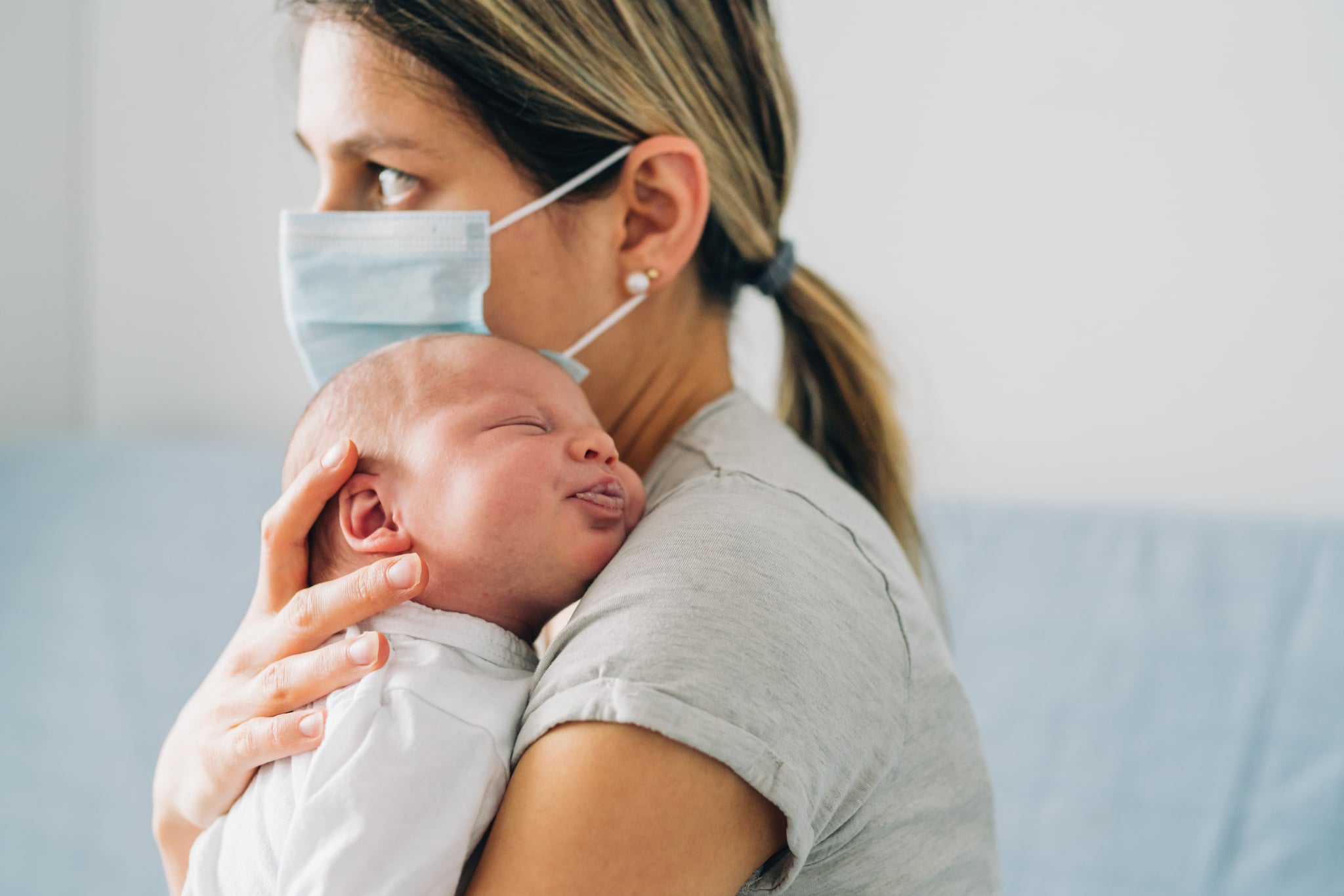How the Coronavirus Pandemic Affects Childbirth and PPD
Postpartum Care Was a Problem Before – Here's What It's Like During a Pandemic

When Jane gave birth back in November 2019, she didn't realise it at the time, but her daily bouts of uncontrollable crying fits were one of the hallmark signs of postpartum depression. It took her several months before she realised her symptoms were intense enough to seek professional help, in which she met with a psychiatrist, got on a low-dose antidepressant, and eventually found a support group of fellow moms. But then, the pandemic hit. In an instant, she went from having a fully-formed treatment plan to having to manage her depression in isolation – all while returning from her maternity leave to a demanding job, now at home and with a new baby.
"My PPD started before the pandemic hit," Jane, whose name has been changed because she wants to remain anonymous, told POPSUGAR. "But because I've been feeling on edge for several months before the coronavirus, it feels like I haven't had a moment to just breathe in a really, really long time."
"My PPD started before the pandemic hit. But because I've been feeling on edge for several months before the coronavirus, it feels like I haven't had a moment to just breathe in a really, really long time."
Like Jane, women who have given birth during normal circumstances are faced with countless stressors — birth plans can go awry, resulting in unexpected C-sections or emergency deliveries. And those first months with a newborn are hard enough in the best of times — they are often filled with frustrating breastfeeding encounters and feelings of anxiety and isolation.
That's all before new mothers were faced with the added side effects of a global public health crisis.
"Coronavirus has had a particularly transformative impact on the pregnancy, birth, and postpartum periods for new mothers, as hospitals and other maternal care providers adapted to comply with recommendations, leading to unprecedented changes in the way maternal care and labour and delivery proceed," Chelsea Allison, the CEO of maternal wellness resource Motherfigure, said in an introduction to a related June report.
These changes have had many unwelcome consequences, and although comprehensive research on the impact of COVID-19 on birth outcomes and perinatal wellbeing may frustratingly not be released for years, women are still giving birth every day, and their struggles are not getting any easier.
In fact, the likelihood of these new mothers to experience postpartum mood and anxiety disorders, otherwise known as PMADs, is hard to refute, even if medical practitioners' case loads aren't any fuller.
Sarah Levine-Miles, a licenced clinical social worker who specialises in PMADs, has noticed this effect first-hand. "I am not necessarily seeing an increase in cases, but I have seen a heightened severity in cases."
Among those cases?
"Mother and baby's sleep, baby's level of success feeding, and family or community support are the biggest factors I see impact postpartum mental health," Levine-Miles told POPSUGAR. But, experts have noted, those are certainly not the only ways the coronavirus outbreak is affecting women.
How the Coronavirus Pandemic Has Affected Birth
Birth, under typical circumstances, is unpredictable. One in three women have C-sections, more than half of women experience issues with urinary incontinence or prolapse after giving birth, and thousands suffer perineal tears. Now, COVID-19 is adding new obstacles to the process, from being required to labour in a mask to the limiting of visitors, including doulas and other birth support people. According to a survey of more than 100 women who gave birth during the pandemic, 20 percent – roughly one in five – rated their birth experience as "poor to very poor," compared with just 10 to 15 percent during ordinary times.
"We have to consider the risks of birth trauma," Helena Vissing, an LA-based mental health provider, told POPSUGAR. "It is a fact that new parents are experiencing a very different kind of care during their delivery at the hospitals, and the link between birth trauma and stress related to delivery and PMAD cases is well-established."
"It is a fact that new parents are experiencing a very different kind of care during their delivery at the hospitals, and the link between birth trauma and stress related to delivery is well-established."
Studies show that labour support – having a doula in the room to coach birthing women and advocate on their behalf – improves outcomes, most notably in terms of reducing the need for medical interventions, including pain medication like epidurals and C-sections. Because most hospitals have limited visitors to one per laborer, doulas have been ostensibly banned, even as shelter-in-place orders began to lift on some states. At best, they have moved toward a virtual format.
"Labour support is hands-on and intimate," Allison noted. "It is difficult to 'read the room' remotely, and the doula is often left to delegate suggestions to partners or an already overstretched nursing staff. The hospital visitor restrictions are especially likely to hurt BIPOC and others from marginalized groups, who may rely on doulas to advocate for them."
For women who want this in-person support, or for those anxious about delivering in a hospital setting, particularly in locations seeing a surge of COVID-19 cases, there are few options. Google searches for "home birth" and related terms reached their highest peak in March, surging between 60 and 100 percent, and they've steadily maintained high monthly averages ever since. However, the demand for out-of-hospital births are outpacing supply. There are just 384 freestanding birth centres in the US, and nine states lack regulations for licencing them at all. Depending on the state, there are often fewer than a couple dozen home-birth midwives.
How the Coronavirus Pandemic Has Affected Breastfeeding
Breastfeeding is a struggle common to new moms that has been exacerbated by COVID-19. Before the pandemic, 60 percent of women said they didn't meet their personal breastfeeding goals – an unsurprising statistic considering there are only 10 lactation consultants for every 1,000 live births in the US.
"Breastfeeding is hard for many women — it's a skill that is learned by both moms and babies, but we put a lot of pressure on ourselves for it to come naturally when it doesn't always," said Allison, who herself sought the help of a lactation consultant a week after giving birth. "Certainly lack of breastfeeding success can contribute to stress, anxiety, disappointment, negative self-talk, and a mismatch of expectations and reality," Allison noted. "That last bit is important: generally, moms who plan or expect to breastfeed but find themselves unable to are the ones that the literature indicates have higher rates of postpartum depression."
Like doulas, lactation consultants typically provide in-person services to help with positioning and latch and to address issues with milk supply or diagnose mastitis – tasks nearly impossible to address virtually.
Levine-Miles confirmed as much: "A lot of mothers have said that breastfeeding has felt more difficult because they have less in-person meetings with consultants."
How the Coronavirus Pandemic Has Affected Preventative Care
Certainly, women's access to their own healthcare providers is limited mid-pandemic. Before delivery, when a pregnant woman would normally expect 14 in-person prenatal visits, many practices have reduced these appointments by as much as half, with in-person sessions limited to essential bloodwork or anatomy scans. Although this certainly mitigates risk in contracting the coronavirus, it offers Ob-Gyns fewer opportunities to notice and address the more subtle health issues that would otherwise go undetected until delivery.
Once a woman gives birth, hospitals are now ushering them home sooner, some within 12 to 24 hours versus the more standard 48-hour stay in order to limit the risk of COVID-19 exposure. And the sole six-week postpartum appointment – which has already been widely deemed as insufficient by experts, not least of which because it fails to screen for PMADs in an appropriate amount of time – is also going remote, despite the fact that it unilaterally involves wound checks and a vaginal exam.
Considering one-third of pregnancy-related deaths in women occur one week to one year postpartum, and that most of them – due to severe bleeding, high blood pressure, or infections – are thought to be preventable, this decline in visits comes with serious, life-threatening risks.
How the Coronavirus Pandemic Has Affected Feelings of Isolation
One of the secondary effects of the coronavirus that is hardest to quantify is the lack of general support new moms are receiving now, whether it be loved ones or a local support group of fellow new parents.
"Sleep is being greatly impacted by the pandemic, as often couples are doing all of the work by themselves, whereas before, a postpartum doula, a family member, or a friend could come over to hold the baby while the main caregivers slept," Levine-Miles said. "Generally, the struggle mothers are having with handling these emotions and fear without loved ones in-person is extremely difficult. Many times just sitting with someone we trust goes a long way."
Further, the pandemic may compound feelings of seclusion, especially for vulnerable women.
"Couples are doing all of the work by themselves, whereas before, a postpartum doula, a family member, or a friend could come over to hold the baby while the main caregivers slept."
"COVID-19 has contributed to the increased risk of depression during the postpartum period as women have decreased access to support networks including church, social gatherings with family and friends, gyms or common areas for exercise," Dr. Valerie Kading, the CEO of the Sierra Tucson Group of behavioural health facilities, told POPSUGAR. "There is also heightened fear and anxiety related to basic daily activities such as grocery shopping, which may further increase a mother's sense of isolation."
One mental health provider polled by Motherfigure added that "many mothers are struggling at home all day along with no breaks or others to come in and help." Although many new moms have partners now at home with them, Allison noted that it still isn't a safeguard many can rely upon: "Many partners are more present than they might otherwise be, given the poor state of parental leave in the United States, due to stay-at-home orders and more flexible remote work policies, but this is a privilege not afforded to all families, especially essential workers."
How the Coronavirus Pandemic Has Affected Postpartum Depression
All of these factors – from traumatic birth experiences to breastfeeding hiccups – can undoubtedly increase a new mom's likelihood of feeling anxious or depressed, but even without any of those tangible issues, PMADs loom. Because current scientific studies are unlikely to complete or publish data until 2021 or 2022, national statistics data can't confirm a rise in postpartum depression, but nearly 71 percent of mental health providers surveyed by Motherfigure have already seen an increase in the severity of PMAD conditions in their practices.
Pre-pandemic, 15 percent of women experienced postpartum depression, and four to 10 percent experiences post-traumatic stress disorder after birth. Now, nearly 73 percent of the women surveyed by Motherfigure self-reported anxiety and depressive symptoms during their postpartum period.
This has led to some debate as to whether postpartum depression, specifically, is getting worse, or if it's just that the population in general is facing more mental health issues.
"Almost everyone right now is at heightened risk for anxiety in this current climate — fear of sickness, worries about job status and one's financial situation, loneliness, loss of routine," Allison said. "And in that respect, some providers I have talked to pointed out that distinguishing between PMADs and more generalised anxiety and mood disorders may not matter — because both are important mental health issues to address through therapy. Several pointed out that if the onset of symptoms comes during the perinatal period and seem related to the pregnancy or child and make functioning difficult, that's a sign that it's PPD-connected."
Still, Levine-Miles believes general anxieties around COVID-19 and postpartum depression look quite different.
"Postpartum depression can look like intense sadness and crying spells, irritability and anger, losing interest in things that were previously enjoyed, feeling like you're a bad mother, and thoughts of hurting yourself," she described. "The way I describe postpartum depression is that you do not feel like yourself for the majority of the time. A general anxiety often makes someone not feel like themselves at times, but not most of the time."
What Is Being Done For Maternal Care Amid the Coronavirus Pandemic
So, what can women – both pregnant and postpartum – do now to prepare themselves? With few other options, nearly every doctor and mental health provider insists upon the use of telehealth.
"Most practices are using telehealth to address gaps, but these visits are typically done in-person for good reason."
"Online tele-therapy provides greater access to mental health treatment for a postpartum woman, as she won't have the challenges of taking her newborn with her to an appointment or finding a caregiver for her child while she attends a therapy appointment," Kading said. "A mother is able to engage in individual therapy virtually while feeling safe in her home from COVID-19."
Still, she recognises its limitations: "That also compounds the isolation and loneliness new mothers feel."
Allison agreed. "Our reality right now means that people cannot extend the same level of in-person support as they once might have," Allison said. "Most practices are using telehealth to address gaps, but these visits are typically done in-person for good reason."
Jane has found her virtual therapy sessions to be "just as helpful" as before, but admits that wasn't the same for all aspects of treatment as she has worked to manage her PPD remotely.
"I found my mom group to be incredibly therapeutic," Jane said of the community of fellow new moms she joined shortly after discovering she had PPD. "Being in a physical space together every week with people who were going through the same thing as me, it really helped me."
She said the shared experience feels less helpful now, with everyone calling in from their iPhones and laptop screens. "We have tried keeping up on Zoom during this time and it just isn't the same. Not having the social aspect of seeing these people has been hard on me."
Kading warns that, during the postpartum period, it's "vital" that moms feel connected to their peers. Her treatment centres offer both individual, partner-based, and group therapy specifically focussed on normalizing the fears of motherhood, destigmatizing PPD, and creating a sense of identity outside of motherhood. And Allison recommended expectant women connect with virtual doulas, lactation consultants, and pelvic floor physical therapists in advance.
"It's good practice to think about birth preferences, not birth plans, because birth isn't something we can control, especially not right now, where reality might look really different from expectations," she said. "If they will need to labour alone, it can be a good idea to work on visualization techniques or strategies like hypnobirthing. If they have fear of childbirth, it can be helpful to work with a virtual doula or therapist to work through that."
Yet, she knows that this isn't going to be the case for many women. When statistics are eventually made available, Allison fears that even those numbers might not begin to cover the real harm that has befallen new mothers. She said "we need to acknowledge" that there could be a significant drop in ability or willingness to seek help.
"Some providers noted that they see a gap between the need for therapy and the uptake of it."
"Some providers noted that they see a gap between the need for therapy and the uptake of it," she said. "Job loss, loss of insurance, lack of awareness of or scepticism of telehealth, and unpredictable childcare has negatively impacted potential clients in reaching out for help."
Countless mothers, Jane included, can attest that it was already hard enough to get the help they needed before the coronavirus.
And now, as healthcare providers investigate solutions to the challenges millions of new mothers face as they birth amid COVID-19, it underscores the lack of support women have always gotten in their journey to motherhood. Like so much else, it's a systemic problem with far-reaching side effects. The pandemic has just amplified it.









